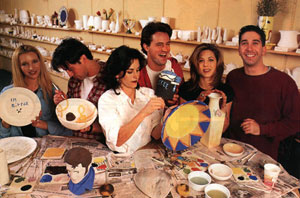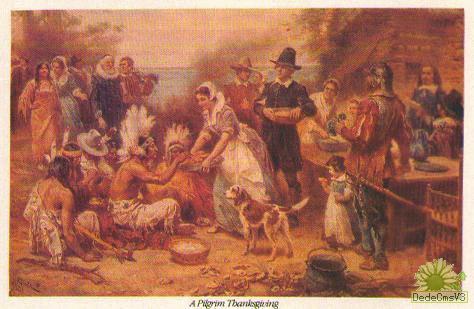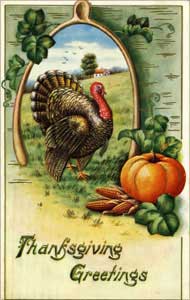Friends 1 《老友记》1(视频精讲九)
(单词翻译:单击)
影片对白
 Ross: Look, if she's talking to it, I just think that I should get some belly1 time too. Not that I believe any of this.
Ross: Look, if she's talking to it, I just think that I should get some belly1 time too. Not that I believe any of this.
Phoebe: Oh, I believe it. I think the baby can totally hear everything. I can show you. Look, this will seem a little weird2, but you put your head inside this turkey, and then we'll all talk, and you'll hear everything we say.
Chandler: I'd just like to say that I'm totally behind this experiment. In fact, I'd very much like to butter your head.
Monica: Hey, Rach, did you make your money?
Rachel: No, not even close. Forget Vail, forget seeing my family, forget shoop, shoop, shoop.
Monica: Rach, here's your mail.
Rachel: Thanks, you can just put it on the table.
Monica: No, here's your mail.
Rachel: Thanks, you can just put it on the table.
Monica: Would you just open it?
Rachel: Oh my god, oh, you guys are great.
Monica: We all chipped in.
Ross: We did?
Rachel: Thank you. Thank you so much!
Monica: Chandler, here you go, got your traditional holiday feast, you got your tomato soup, your grilled4 cheese fixin's, and your family size bag of Funyuns.
Rachel: Wait, wait, Chandler, this is what you're havin' for Thanksgiving dinner? What, what, what is it with you and this holiday?
Chandler: All right, I'm nine years old.
Ross: Oh, I hate this story.
Chandler: We just finished this magnificent Thanksgiving dinner. I have--and I remember this part vividly--a mouthful of pumpkin5 pie, and this is the moment my parents choose to tell me they're getting divorced.
Rachel: Oh my god.
Chandler: Yes. Yes. Very difficult to appreciate a Thanksgiving dinner once you've seen it in reverse.
Joey: Uh, hi. We uh, we used to work together.
Girl: We did?
Joey: Yeah, at Macy's. You were the Obsession6 girl, right?
Girl: Yes?
Joey: I was the Aramis guy. Aramis? Aramis? Aramis?
Girl: Yeah, right.
Joey: I gotta tell you. You're the best in the business.
Girl: Get out.
Joey: I'm serious. You're amazing. You know when to spritz, you know when to lay back.
Girl: Really? You don't know what that means to me.
Joey: Ooh, you smell great tonight. What're you wearing?
Girl: Nothing.
 Joey: Listen, uh, you wanna go get a drink or something?
Joey: Listen, uh, you wanna go get a drink or something?
Girl: Yeah. Oh.
Joey: What's wrong?
Girl: I just remembered, I have to do something.
Joey: Oh. What?
Girl: Um, leave.
Joey: Wait, wait, wait!
妙词佳句,活学或用
1. not even close 差得远呢
- Hey, Rach, did you make your money?
- No, not even close.
- 咳,瑞秋,你赚到你的钱(数目)了吗?
- 没有,差得远呢。
Close的本意是“接近”,比如:
Yao Ming was this close to become the most valuable player in the history of basketball.
姚明差一点就成了篮球史上最有价值的运动员。
2. chip in 凑份子
We all chipped in.
我们每个人都凑了份子钱。
Just like classmates across the country, they all chipped in to buy a classmate a birthday gift.
和全国一样,他们凑钱给同班同学买了一份生日礼物。
3. in reverse 颠倒、逆转
这里Chandler的意思是感恩节给他的感觉和通常人们认为的欢乐气氛相反。
It's very difficult to appreciate a Thanksgiving dinner once you've seen it in reverse.
一旦经历过那样不愉快的感恩节晚餐,你是很难会喜欢它的。
Could Iraq be Vietnam in reverse?
伊拉克有可能成为第二个越南吗?
4. get out 胡说、去你的
记住,在这里可不是“滚蛋”的意思。
- You're the best in the business.
- Get out.
- 你是这行里最优秀的。
- 少来了。
5. lay back 放松
You know when to spritz, when to lay back.
你知道什么时候需要动,什么时候需要静。
Just lay back and enjoy the ride.
只管放松享受这一程吧(指骑马)。
文化面面观
Thanksgiving 感恩节
对感恩节这个节日大家应该都不陌生。现在让我们一起来追溯一下感恩节的历史和习俗吧!
The History and Origin of Thanksgiving Day
Almost every culture in the world has held celebrations of thanks for a plentiful7 harvest. The American Thanksgiving holiday began as a feast of thanksgiving in the early days of the American colonies almost four hundred years ago. In 1620, a boat filled with more than one hundred people sailed across the Atlantic Ocean to settle in the New World. This religious group had begun to question the beliefs of the Church of England and they wanted to separate from it. The Pilgrims settled in what is now the state of Massachusetts. Their first winter in the New World was difficult. They had arrived too late to grow many crops, and without fresh food, half the colony died from disease. The following spring the Iroquois Indians taught them how to grow corn (maize), a new food for the colonists8. They showed them other crops to grow in the unfamiliar9 soil and how to hunt and fish.
In 1620, a boat filled with more than one hundred people sailed across the Atlantic Ocean to settle in the New World. This religious group had begun to question the beliefs of the Church of England and they wanted to separate from it. The Pilgrims settled in what is now the state of Massachusetts. Their first winter in the New World was difficult. They had arrived too late to grow many crops, and without fresh food, half the colony died from disease. The following spring the Iroquois Indians taught them how to grow corn (maize), a new food for the colonists8. They showed them other crops to grow in the unfamiliar9 soil and how to hunt and fish.
In the autumn of 1621, bountiful crops of corn, barley10, beans and pumpkins11 were harvested. The colonists had much to be thankful for, so a feast was planned. They invited the local Indian chief and 90 Indians. The Indians brought deer to roast with the turkeys and other wild game offered by the colonists. The colonists had learned how to cook cranberries12 and different kinds of corn and squash dishes from the Indians. To this first Thanksgiving, the Indians had even brought popcorn13.
In following years, many of the original colonists celebrated14 the autumn harvest with a feast of thanks. After the United States became an independent country, Congress recommended one yearly day of thanksgiving for the whole nation to celebrate. George Washington suggested the date November 26 as Thanksgiving Day. Then in 1863, at the end of a long and bloody15 civil war, Abraham Lincoln asked all Americans to set aside the last Thursday in November as a day of thanksgiving.
Celebration  Turkey, corn (or maize), pumpkins and cranberry16 sauce are symbols which represent the first Thanksgiving. Now all of these symbols are drawn17 on holiday decorations and greeting cards.
Turkey, corn (or maize), pumpkins and cranberry16 sauce are symbols which represent the first Thanksgiving. Now all of these symbols are drawn17 on holiday decorations and greeting cards.
The use of corn meant the survival of the colonies. "Indian corn" as a table or door decoration represents the harvest and the fall season.
Sweet-sour cranberry sauce, or cranberry jelly, was on the first Thanksgiving table and is still served today. The cranberry is a small, sour berry. It grows in bogs18, or muddy areas, in Massachusetts and other New England states. The Indians used the fruit to treat infections. They used the juice to dye their rugs and blankets. They taught the colonists how to cook the berries with sweetener and water to make a sauce. The Indians called it "ibimi" which means "bitter berry." When the colonists saw it, they named it "crane-berry" because the flowers of the berry bent19 the stalk over, and it resembled the long-necked bird called a crane.
The berries are still grown in New England. Very few people know, however, that before the berries are put in bags to be sent to the rest of the country, each individual berry must bounce at least four inches high to make sure they are not too ripe!
In 1988, a Thanksgiving ceremony of a different kind took place at the Cathedral of St. John the Divine. More than four thousand people gathered on Thanksgiving night. Among them were Native Americans representing tribes from all over the country and descendants of people whose ancestors had migrated to the New World.
The ceremony was a public acknowledgment of the Indians' role in the first Thanksgiving 350 years ago. Until recently most schoolchildren believed that the Pilgrims cooked the entire Thanksgiving feast, and offered it to the Indians. In fact, the feast was planned to thank the Indians for teaching them how to cook those foods. Without the Indians, the first settlers would not have survived.
考考你
用今日所学将下面的句子译成英语。
1. 他所有的亲戚都凑钱给他交高昂的学费。
2. 先发制人,罗伯特说,不是美国的风格--那将是“第二个珍珠港”。
3. 有些时候你需要放松放松,享受生活。
4. - 你是我见过的最漂亮的女生。
- 胡说。我没那么好啦。
Friends 1 《老友记》1(精讲之八)考考你 参考答案
1. 真的很遗憾,但是我要离开了,因为我不能接受你对待我的方式。
It's such a shame, but I'm leaving, 'cause I can't take the way you treated me.
2. 我需要你给我介绍一个合适的对象。
I need you to set me up with someone right for me.
3. 他们自贬形象,说:“我配不上她,”而不是说“我知道如何制造吸引力。”
"They say, "She's out of my league," diminishing their own self image, instead of saying, "I know how to create attraction."
4. 女为悦己者容。
Women dress up for their beholders.
 收听单词发音
收听单词发音 



